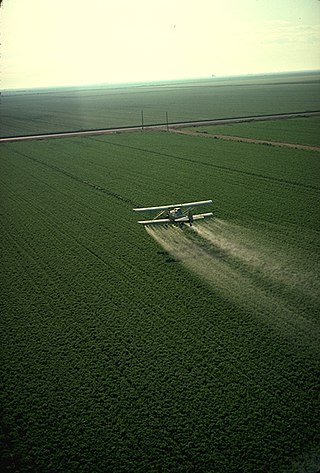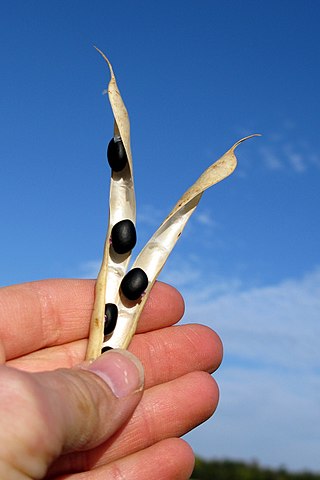Related Research Articles

Agriculture encompasses crop and livestock production, aquaculture, fisheries and forestry for food and non-food products. Agriculture was the key development in the rise of sedentary human civilization, whereby farming of domesticated species created food surpluses that enabled people to live in cities. While humans started gathering grains at least 105,000 years ago, nascent farmers only began planting them around 11,500 years ago. Sheep, goats, pigs and cattle were domesticated around 10,000 years ago. Plants were independently cultivated in at least 11 regions of the world. In the twentieth century, industrial agriculture based on large-scale monocultures came to dominate agricultural output.

Pesticides are substances that are meant to control pests. This includes herbicide, insecticide, nematicide, molluscicide, piscicide, avicide, rodenticide, bactericide, insect repellent, animal repellent, microbicide, fungicide, and lampricide. The most common of these are herbicides, which account for approximately 50% of all pesticide use globally. Most pesticides are intended to serve as plant protection products, which in general, protect plants from weeds, fungi, or insects. As an example, the fungus Alternaria solani is used to combat the aquatic weed Salvinia.

Organic farming, also known as ecological farming or biological farming, is an agricultural system that uses fertilizers of organic origin such as compost manure, green manure, and bone meal and places emphasis on techniques such as crop rotation and companion planting. It originated early in the 20th century in reaction to rapidly changing farming practices. Certified organic agriculture accounts for 70 million hectares globally, with over half of that total in Australia. Organic farming continues to be developed by various organizations today. Biological pest control, mixed cropping and the fostering of insect predators are encouraged. Organic standards are designed to allow the use of naturally-occurring substances while prohibiting or strictly limiting synthetic substances. For instance, naturally-occurring pesticides such as pyrethrin are permitted, while synthetic fertilizers and pesticides are generally prohibited. Synthetic substances that are allowed include, for example, copper sulfate, elemental sulfur and Ivermectin. Genetically modified organisms, nanomaterials, human sewage sludge, plant growth regulators, hormones, and antibiotic use in livestock husbandry are prohibited. Organic farming advocates claim advantages in sustainability, openness, self-sufficiency, autonomy and independence, health, food security, and food safety.

Intensive agriculture, also known as intensive farming, conventional, or industrial agriculture, is a type of agriculture, both of crop plants and of animals, with higher levels of input and output per unit of agricultural land area. It is characterized by a low fallow ratio, higher use of inputs such as capital and labour, and higher crop yields per unit land area.

Chipotle Mexican Grill, Inc., often known simply as Chipotle, is an American chain of fast casual restaurants specializing in bowls, tacos and Mission burritos made to order in front of the customer. Chipotle operates restaurants in the United States, United Kingdom, Canada, Germany, and France. Its name derives from chipotle, the Nahuatl name for a smoked and dried jalapeño chili pepper.

In agriculture, a green manure is a crop specifically produced to be incorporated into the soil while still green. Typically, the green manure's biomass is incorporated with a plow or disk, as is often done with (brown) manure. The primary goal is to add organic matter to the soil for its benefits. Green manuring is often used with legume crops to add nitrogen to the soil for following crops, especially in organic farming, but is also used in conventional farming.

An agrochemical or agrichemical, a contraction of agricultural chemical, is a chemical product used in industrial agriculture. Agrichemical refers to biocides and synthetic fertilizers. It may also include hormones and other chemical growth agents.
"Dead Celebrities" is the eighth episode of the thirteenth season of the American animated television series South Park. The 189th overall episode of the series, it originally aired on Comedy Central in the United States on October 7, 2009. In the episode, Ike is haunted by the ghosts of dead celebrities who died in the Summer of 2009 until Michael Jackson, who does not want to admit that he is dead, possesses him.

Raymond Herbert Wise is an American actor. He is best known for his role as Leland Palmer in Twin Peaks and its prequel film Twin Peaks: Fire Walk with Me (1992), Vice President Hal Gardner in 24 (2006), The Devil in Reaper (2007–2009), and Marvin in Fresh Off the Boat (2015–2020), as well as his film roles in Swamp Thing (1982), RoboCop (1987), and Jeepers Creepers 2 (2003).
Steve Ells is an American businessman. He is the founder, former CEO, and former Executive Chairman of Chipotle Mexican Grill. Ells founded Chipotle in 1992, and under his direction, the chain serves what it describes as "naturally raised meat" and promotes sustainable agriculture.

Organic food, ecological food, or biological food are foods and drinks produced by methods complying with the standards of organic farming. Standards vary worldwide, but organic farming features practices that cycle resources, promote ecological balance, and conserve biodiversity. Organizations regulating organic products may restrict the use of certain pesticides and fertilizers in the farming methods used to produce such products. Organic foods are typically not processed using irradiation, industrial solvents, or synthetic food additives.

Agriculture in the United Kingdom uses 71% of the country's land area, employs 1% of its workforce and contributes 0.5% of its gross value added. The UK currently produces about 60% of its domestic food consumption.

Food, Inc. is a 2008 American documentary film directed by Robert Kenner and narrated by Michael Pollan and Eric Schlosser. It examines corporate farming in the United States, concluding that agribusiness produces food that is unhealthy in a way that is environmentally harmful and abusive of both animals and employees. The film received positive reviews and was nominated for several awards, including the Academy Award for Best Documentary Feature and the Independent Spirit Award for Best Documentary Feature. A sequel is in the works and is scheduled to be released in late 2023.
The environmental impact of agriculture is the effect that different farming practices have on the ecosystems around them, and how those effects can be traced back to those practices. The environmental impact of agriculture varies widely based on practices employed by farmers and by the scale of practice. Farming communities that try to reduce environmental impacts through modifying their practices will adopt sustainable agriculture practices. The negative impact of agriculture is an old issue that remains a concern even as experts design innovative means to reduce destruction and enhance eco-efficiency. Though some pastoralism is environmentally positive, modern animal agriculture practices tend to be more environmentally destructive than agricultural practices focused on fruits, vegetables and other biomass. The emissions of ammonia from cattle waste continue to raise concerns over environmental pollution.

Agricultural pollution refers to biotic and abiotic byproducts of farming practices that result in contamination or degradation of the environment and surrounding ecosystems, and/or cause injury to humans and their economic interests. The pollution may come from a variety of sources, ranging from point source water pollution to more diffuse, landscape-level causes, also known as non-point source pollution and air pollution. Once in the environment these pollutants can have both direct effects in surrounding ecosystems, i.e. killing local wildlife or contaminating drinking water, and downstream effects such as dead zones caused by agricultural runoff is concentrated in large water bodies.

Natural farming, also referred to as "the Fukuoka Method", "the natural way of farming" or "do-nothing farming", is an ecological farming approach established by Masanobu Fukuoka (1913–2008). Fukuoka, a Japanese farmer and philosopher, introduced the term in his 1975 book The One-Straw Revolution. The title refers not to lack of effort, but to the avoidance of manufactured inputs and equipment. Natural farming is related to fertility farming, organic farming, sustainable agriculture, agroecology, agroforestry, ecoagriculture and permaculture, but should be distinguished from biodynamic agriculture.

Organic beans are produced and processed without the use of synthetic fertilizers and pesticides. In 2008, over 2,600,000 acres (11,000 km2) of cropland were certified organic in the United States. Dry beans, snap beans, and soybeans were grown on 16,000 acres (65 km2), 5,200 acres (21 km2), and 98,000 acres (400 km2), respectively.

The Scarecrow is a 2013 animated short film and advertisement by the American restaurant chain Chipotle Mexican Grill. The film features Fiona Apple singing a cover version of "Pure Imagination", originally performed by Gene Wilder as Willy Wonka in the 1971 film Willy Wonka & the Chocolate Factory.

GMO conspiracy theories are conspiracy theories related to the production and sale of genetically modified crops and genetically modified food. These conspiracy theories include claims that agribusinesses, especially Monsanto, have suppressed data showing that GMOs cause harm, deliberately cause food shortages to promote the use of GM food, or have co-opted government agencies such as the United States Food and Drug Administration or scientific societies such as the American Association for the Advancement of Science. Critics charge that GMO conspiracy theories are largely promulgated by those opposing the production and sale of GMOs, and instances of unsubstantiated conspiracy theories have lately occurred in the context of public health issues that are mostly unrelated to GMOs, including the 2015–16 Zika virus outbreak and concerns over food safety at Chipotle Mexican Grill.
References
- ↑ Doering, Christopher (3 March 2014). "Chipotle's farm satire upsets agriculture industry". USA Today. Retrieved 7 March 2014.
- ↑ "IMDB Episode Cast". IMDb . Archived from the original on 28 March 2014. Retrieved 12 March 2014.